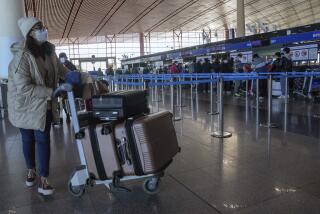Last SARS Hot Spot Contained
- Share via
Geneva — The World Health Organization removed the last region -- Taiwan -- from its list of SARS-infected areas Saturday, marking the end of an outbreak that in its three-month surge around the world infected thousands and shook economies from Asia to North America.
Taiwan was given a clean bill of health by the United Nations agency because its most recent victim was isolated 20 days earlier, twice the length of the disease’s incubation period.
“The SARS outbreak has been contained worldwide,” said WHO Director-General Gro Harlem Brundtland.
She credited “unprecedented global collaboration” for overcoming a contagion that spread to 30 nations on five continents, sickening 8,439 people and killing 812.
But Brundtland warned that the world is not yet free of SARS. Some 200 SARS patients remain under hospital quarantine, and “it is possible that some SARS cases have slipped through the surveillance net,” she said. “We know that one single case can spark a new outbreak.”
The WHO believes the virus, whose spread came to epitomize the fearsome power of emerging diseases to travel the world and disrupt societies far from the epicenter of an outbreak site, is likely to flare up again this fall or winter, following the seasonal pattern of cold and flu viruses.
“A false [sense of] security could become our worst enemy,” said David Heymann, director of the WHO’s communicable diseases division, which coordinated the worldwide fight against SARS.
If SARS proves to have seasonal cycles, public health authorities could face formidable challenges distinguishing the new disease from more common ailments that also cause fever and influenza-like symptoms.
Brundtland, however, said the world is much better prepared if there is a next time.
Researchers are moving quickly to create a fast, reliable test that can identify the disease in its early stages. And unlike the first outbreak of SARS, which was allowed to spread, in part, by the Chinese government’s failure to report the disease as it first gained momentum, every nation is now aware of the potential cost of hiding an outbreak.
“There is no way to hide anymore,” Brundtland said.
Severe acute respiratory syndrome originated in China’s Guangdong province last fall, possibly passed to humans from an animal known as a civet, which has the body of a small fox and a face like a weasel’s. The animal is considered a culinary delicacy in parts of Asia.
SARS is a “perfect storm” of a disease, transmitted through coughs and sneezes even before it debilitates victims. It is impervious to known medicines and deadly, killing up to 13% of young and middle-aged patients, according to one Hong Kong study. The disease is caused by a coronavirus, a family of viruses that causes about 30% of common colds.
In late February, the illness began to traverse the globe via air travelers. A single victim -- a Guangdong doctor who stayed at a Hong Kong hotel -- infected at least 12 other guests and visitors, several of whom took the virus with them to distant cities, including Toronto.
That fateful journey is blamed for most of Canada’s 38 SARS deaths, as well as its economic damage.
The ensuing crisis grew directly from the misguided and ultimately self-defeating efforts by the Chinese government to cover up the SARS outbreak for several months. When the infection became impossible to hide, it had already eclipsed China’s ability to contain its own SARS problem, let alone control SARS’ international spread.
Once the scope of the outbreak became impossible to ignore, efforts to stem it were swift -- some would say brutal.
The key tools were strict quarantines -- the time-honored approach to stopping person-to-person transmissions -- and travel warnings, which froze the spread of SARS as they stung economies.
In Singapore, Internet-linked cameras spied on quarantined victims, while the Chinese instituted travel controls on residents of some cities.
The WHO issued sharply worded warnings against all but essential travel to hard-hit areas -- its first travel alerts despite some 900 communicable disease outbreaks monitored by the agency since 1997.
The warnings inflicted swift economic damage in a few nations. Only 40,000 tourists visited Taiwan in May, compared with about 250,000 the month before the outbreak. Toronto and China lost billions of dollars in trade and tourism.
In an interview, Brundtland defended the measures as crucial.
“If we had had a more detached attitude and left it to the member states to spread the word, it would have lost a lot of time,” she said.
With the likelihood of a new round of SARS infections in the fall, the WHO is hoping to build on the multinational cooperation created during the crisis to limit any future outbreak.
Health authorities and governments worldwide are now painfully aware of what can happen if they remain silent or are slow to react. Doctors are also more familiar with the symptoms of SARS, increasing chances that the disease could be caught early.
The WHO is focusing its attention on finding reservoirs of the SARS virus in animal populations and perhaps in apparently healthy or mildly ill people who might still spread the disease.
The agency is also promoting the development of a global database to put the knowledge gained during the outbreak into the hands of SARS researchers and clinicians.
Stopping new SARS outbreaks might also depend on cutting off the virus’ original route from wild animals to people. Novel diseases will continue to emerge until more hygienic practices are adopted in handling wild animals worldwide.
“In a place like China, people eat on tables that are literally over the place the animals are slaughtered,” said Robert H. Brook, chief health researcher at the Rand Corp. “The real question for WHO is: Can they change the way animals are slaughtered?”
Researchers around the world are working to find a cure or vaccine to prevent the disease. While there have been some promising leads, a vaccine that can be used on humans is probably years away.
At least for now, however, the world has won a brief respite from SARS. In a joyous ritual that has been replayed around the globe over the last few weeks, Taiwan residents began doffing their surgical masks, which had become ubiquitous.
Taiwan had reported 674 cases of SARS and 84 deaths -- the highest death total after China, with 348 deaths, and Hong Kong, with 298.
Taiwanese officials breathed a long-awaited sigh of relief. “We can finally return to our normal lives,” said Taiwanese Prime Minister Yu Shyi-kun.
But he cautioned, “We still have to watch closely whether it will come back or not.”
Times wire services contributed to this report.
More to Read
Sign up for Essential California
The most important California stories and recommendations in your inbox every morning.
You may occasionally receive promotional content from the Los Angeles Times.













